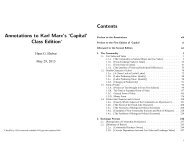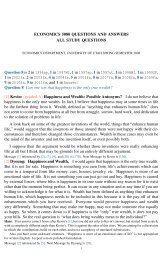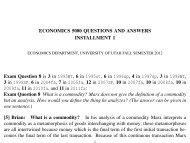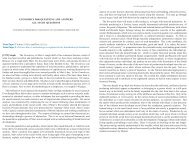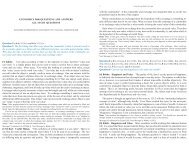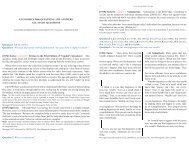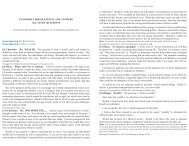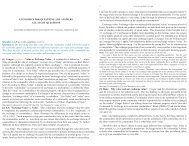Question 1 What did Marx mean with his formu - University of Utah
Question 1 What did Marx mean with his formu - University of Utah
Question 1 What did Marx mean with his formu - University of Utah
You also want an ePaper? Increase the reach of your titles
YUMPU automatically turns print PDFs into web optimized ePapers that Google loves.
U <strong>of</strong> <strong>Utah</strong> Econ 5080 2007fa 99<br />
Most economist regardless <strong>of</strong> their school <strong>of</strong> thought can acknowledge our economy functions<br />
in a circular fashion. My spending becomes your earnings and in turn your earnings<br />
become my spending. The system spins round and round like a toy top. For reasons we do<br />
not always understand the top occasionally loses momentum slows to stop and falls on the<br />
floor. Usually the top does not just crash to the floor, we can feel it losing speed. To carry<br />
the metaphor as the top loses speed one is earning less and less and rational individuals as<br />
they earn less and less hoard more and more to carry themselves through the lean times.<br />
Sadly t<strong>his</strong> is a Chinese-finger trap. The more one saves, the less one spends, the less<br />
everyone else earns the more they save and they cycle continues like water washing down a<br />
drain until there is nothing left and the system stagnates. Saving, which all respects appears<br />
to be a rational choice is not in mine or societies best interest. Liquidity is the grease that<br />
keeps the system moving. Even though saving is rational my rational choice helps breaks<br />
the system which is not in my best interest.<br />
Keynes also carries t<strong>his</strong> idea over into <strong>his</strong> theory <strong>of</strong> “price stickiness”. We have to remember<br />
that Keynes lived through the Great Depression. The concepts <strong>of</strong> inflation and deflation<br />
were ever present. Keynes sensibly reasoned that it is easier for prices to go up, to inflate<br />
than in it is to go down or deflate. None <strong>of</strong> us complains when our wages increases, each <strong>of</strong><br />
us wants to see a higher bottom line. However none or very few us want to see our paychecks<br />
shrink. We will resist deflation even it <strong>mean</strong>s a return to market equilibrium and the same or<br />
a higher purchasing power. It is rational to want a higher number on our paychecks, it is not<br />
always in our best interest.<br />
A society cannot function in a hyper inflation economy it is too volatile. There is a chain<br />
<strong>of</strong> producers and suppliers in our country. There are people who produce cotton to sell to<br />
the fabric factory which sells shirts to the retail clothing outlet ( a gross over simplification<br />
I understand but one gets the idea). Said retail clothing outlet has competitors. When prices<br />
start to run-away and escalate out <strong>of</strong> control, no one wants to be the first to cut prices. Every<br />
part <strong>of</strong> the chain has another part <strong>of</strong> the chain to pay, if one cuts prices pr<strong>of</strong>it diminishes or<br />
disappears.<br />
We live in a pr<strong>of</strong>it seeking society, no one wants to realize diminishing pr<strong>of</strong>its or disappearing<br />
it is not rational. Even given that price cutting would lead to others cutting their<br />
prices and an eventual downward price adjustment which is in my best interest no one wants<br />
to be the first. Losing money is not rational. It is another scenario where behaving rationally<br />
is not in my best interest.<br />
Keynes is splitting hairs in a sense but he is saying that even though we behave rationally<br />
or rationality is not always in our best interests. Basically our behaving rationally is<br />
not rational. He is opening the door for challenging a basic tenant <strong>of</strong> classical economics.<br />
Admitting that the system can break and allowing that classical assumptions do not always<br />
hold true is a large step. And it is one step closer to <strong>Marx</strong>.<br />
Next Message by RemyClaudette is [478].<br />
Exam <strong>Question</strong> 241 is 184 in 2002fa, 193 in 2003fa, 220 in 2004fa, 236 in 2007SP, 248<br />
in 2008SP, 246 in 2008fa, 287 in 2010fa, and 270 in 2012fa:<br />
100 2007fa Econ 5080 U <strong>of</strong> <strong>Utah</strong><br />
Exam <strong>Question</strong> 241 Why does <strong>Marx</strong> explore the mysterious character <strong>of</strong> the commodity,<br />
which is bland and abstract, instead <strong>of</strong> picking up one <strong>of</strong> the many striking outwardly mysterious<br />
phenomena <strong>of</strong> capitalism?<br />
[120] JoshS: Bland and Abstract. From my short time reading Karl <strong>Marx</strong>, homework<br />
submissions, and Hans’s annotations to Das Kapital, I’ve come to the conclusion that <strong>Marx</strong><br />
is not only concerned <strong>with</strong> the mysterious phenomena <strong>of</strong> capitalism, but seeks to explain<br />
all aspects <strong>of</strong> capitalism. If <strong>Marx</strong> were to only discuss and expound on the exciting and<br />
titillating aspects <strong>of</strong> capital, <strong>his</strong> book would be half as long and I don’t think it would be the<br />
work that it is. We have t<strong>his</strong> class and discussion based on <strong>Marx</strong> and <strong>his</strong> thorough discussion<br />
<strong>of</strong> all aspets <strong>of</strong> capital.<br />
When a child wants to become a musician and play wonderfull music, that child must<br />
first learn all the basics <strong>of</strong> tempo, rythm, note reading, etc. So it is <strong>with</strong> <strong>Marx</strong>. He seeks to<br />
explain everything about the nature <strong>of</strong> capitalism to have a full, precise knowledge <strong>of</strong> it.<br />
Hans: Such a general answer is always true. In the given situation <strong>Marx</strong> has more specific reasons to go back to<br />
the basics.<br />
Next Message by JoshS is [122].<br />
<strong>Question</strong> 242 is 123 in 1995WI, 134 in 1996sp, 137 in 1997ut, 164 in 2000fa, 186 in<br />
2002fa, 194 in 2003fa, 221 in 2004fa, 249 in 2008SP, 247 in 2008fa, 260 in 2011fa, and<br />
272 in 2012fa:<br />
<strong>Question</strong> 242 Whether the commodity is “mysterious” or not is a value judgment which<br />
can neither be proved nor disproved. Do you agree? <strong>What</strong> would <strong>Marx</strong> say about t<strong>his</strong>?<br />
[110] Dyoung: graded B– The mystery <strong>of</strong> commodities: why are they mysterious? I<br />
agree, but mostly because I am an antagonist. In many aspects commodities could be considered<br />
to have a mysterious component that adds to their value. I don’t think t<strong>his</strong> goes for<br />
all commodities. There are also many commodities that seem to be free <strong>of</strong> mystery, it simply<br />
takes x amount <strong>of</strong> labor and other costs to create the commodity, so therefore the commodity<br />
costs y. There are things that in some way change commodities so they have more or<br />
less value, besides supply and demand, things that are created socially, for example brand<br />
name items cost more simply because <strong>of</strong> the brand name. . . t<strong>his</strong> is what I feel creates the<br />
mystery. I don’t agree that all commodities have t<strong>his</strong> “mystery” component and that’s why<br />
I feel that it would be a value judgement, which if it is then a value judgement each person<br />
is deciding based on their own view <strong>of</strong> each commodity, and it becomes impossible to say<br />
which commodities have t<strong>his</strong> “mystery” component and which do not.<br />
<strong>Marx</strong> would disagree <strong>with</strong> t<strong>his</strong> statement. To him, it was very important to understand<br />
why they are mysterious. And I think <strong>his</strong> interpretation <strong>of</strong> the mystery factor is that each<br />
commodity contains the development <strong>of</strong> capital and money, yet each commodity is also<br />
influenced externally by the characters <strong>of</strong> capital and money. Each is in the commodity<br />
intrinsically, yet each also can act on the commodity to further determine the commodity’s<br />
value.<br />
Hans: Even if the value <strong>of</strong> a commodity is not propped up in your mind by a marketing campaign, alone the fact<br />
that commodities can be exchanged for each other, or bought and sold, is mysterious. The commodities are active<br />
in these transactions because the prices are not set by the commodity owners, but seem to reside in the commodities<br />
themselves. T<strong>his</strong> is basically things telling people what to do, not the other way around.



